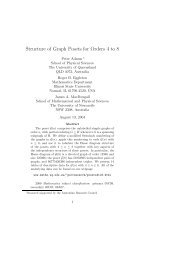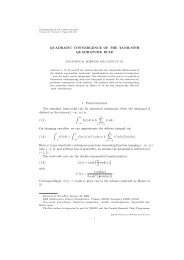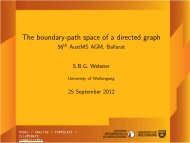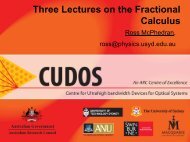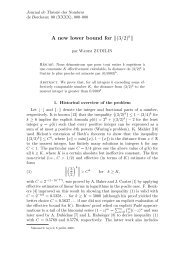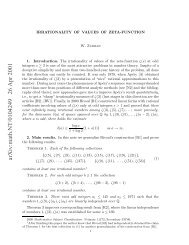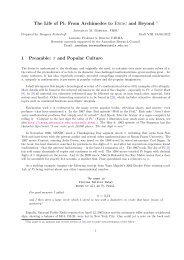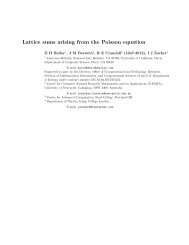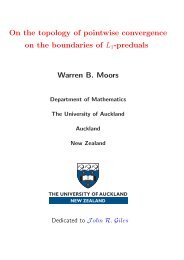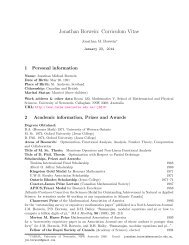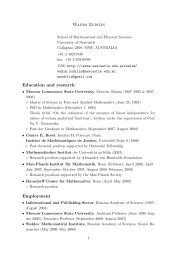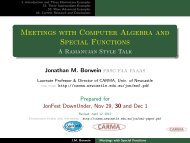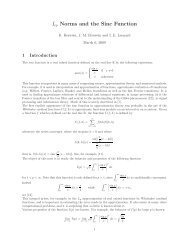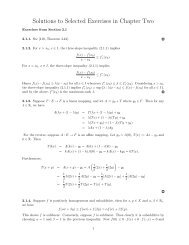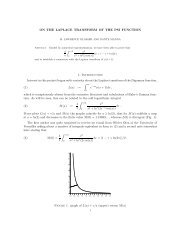Federated World Directory of Mathematicians
Federated World Directory of Mathematicians
Federated World Directory of Mathematicians
Create successful ePaper yourself
Turn your PDF publications into a flip-book with our unique Google optimized e-Paper software.
A PROTOTYPE FOR THE FEDERATED WORLD DIRECTORY<br />
OF MATHEMATICIANS<br />
JONATHAN M. BORWEIN, MASON MACKLEM AND JAEHYUN PAEK<br />
Abstract. In 1998, the International Math Union asked its Committee on<br />
Electronic Information Communication (CEIC) to consider an electronic <strong>World</strong><br />
<strong>Directory</strong> <strong>of</strong> <strong>Mathematicians</strong> to replace the traditional hard-copy version. The<br />
CEIC concluded that intellectual property and privacy issues across various<br />
countries made such a directory infeasible for the 2002 edition. In 2004, the<br />
IMU endorsed moving ahead with a federated search protocol. We describe a<br />
prototype, the <strong>Federated</strong> <strong>World</strong> <strong>Directory</strong> <strong>of</strong> <strong>Mathematicians</strong> (FWDM), where<br />
a common interface searches and retrieves information online from national<br />
mathematical society directories, with no additional work for the user and no<br />
single combined directory. We also discuss some <strong>of</strong> the IP and copyright issues<br />
preventing a combined directory.<br />
1. Background<br />
The International Mathematical Union (IMU) is a non-governmental and nonpr<strong>of</strong>it<br />
scientific organization that oversees the promotion and development <strong>of</strong> mathematics<br />
research throughout the world. The IMU has a wide range <strong>of</strong> responsibilities,<br />
including helping to improve mathematical education in developing countries,<br />
and sponsoring lectures and international meetings. These responsibilities are met<br />
partly through a number <strong>of</strong> IMU Commissions, including the Commission on Development<br />
and Exchange (CDE), the International Commission on Mathematical<br />
Instruction (ICMI) and the Commission on Electronic Information and Communication<br />
(CEIC).<br />
The most public responsibility <strong>of</strong> the IMU is the organization <strong>of</strong> the International<br />
Congress <strong>of</strong> <strong>Mathematicians</strong> (ICM) every four years. This meeting includes<br />
presentations on the frontier <strong>of</strong> mathematical research, as well as the awarding <strong>of</strong><br />
the Fields Medals and the Nevanlinna Prize. Timed to coincide with the ICM is<br />
the publication every four years <strong>of</strong> the <strong>World</strong> <strong>Directory</strong> <strong>of</strong> <strong>Mathematicians</strong> (WDM)<br />
by the IMU and the American Mathematical Society (AMS); the goal <strong>of</strong> the WDM<br />
is to list all active research mathematicians throughout the world.<br />
Data collection for individual mathematicians for inclusion in the WDM is not<br />
performed directly by the IMU. The IMU does not have individual memberships;<br />
instead, its members consist <strong>of</strong> either national mathematical societies or national<br />
academies <strong>of</strong> science, with each member nation required to uphold standards <strong>of</strong><br />
mathematical research. The IMU currently has 66 member nations, and delegates<br />
from each member nation form the IMU General Assembly, which meets at the ICM<br />
every four years. Data for the WDM is collected by each <strong>of</strong> the national societies,<br />
and is provided to the IMU for inclusion in the published list.<br />
In 1998, the International Math Union asked the CEIC to consider an Electronic<br />
<strong>World</strong> <strong>Directory</strong> <strong>of</strong> <strong>Mathematicians</strong> to replace the traditional hard-copy version.<br />
1
2 JONATHAN M. BORWEIN, MASON MACKLEM AND JAEHYUN PAEK<br />
However, the CEIC concluded that a centralized electronic database would be subject<br />
to intellectual property and privacy laws on digital information, laws which<br />
vary across different countries; as such, the conclusion was that such a directory<br />
would be infeasible for the 2002 published edition.<br />
In 2004, the IMU endorsed moving ahead with a federated search protocol. <strong>Federated</strong><br />
searching connotes any system that provides a common user interface for<br />
searching and retrieving information across heterogeneous datasets over the Internet.<br />
Using a federated search model, a centralized database would be unnecessary,<br />
as this data could be gathered by combining the information retrieved separately<br />
from each member nation’s membership list; this avoids the need for caching database<br />
entries, which raises a host <strong>of</strong> legal and privacy issues.<br />
We describe a prototype, the <strong>Federated</strong> <strong>World</strong> <strong>Directory</strong> <strong>of</strong> <strong>Mathematicians</strong><br />
(FWDM), where a common interface searches and retrieves information online from<br />
national mathematical society directories, with no additional work for the user and<br />
no single combined directory. We also discuss some <strong>of</strong> the IP and copyright issues<br />
preventing a combined directory.<br />
2. Partner websites<br />
A federated search engine provides a single user interface for input, which we<br />
will refer to as the parent search engine. The parent sends this input to a number<br />
<strong>of</strong> different child search engines, with each parameter formatted to make it compatible<br />
with the search parameters <strong>of</strong> each child search engine. The resulting output<br />
from each <strong>of</strong> the separate search engines is then returned to the user in a single<br />
combined output. In our prototype, the child search engines are those built by<br />
each member member nation to search their respective membership lists, and the<br />
combined output consists <strong>of</strong> a list <strong>of</strong> links to the individual members’ listings on<br />
their respective member nations’ membership page. The prototype interface, with<br />
sample output, is shown in Figures 1 and 2.<br />
The goal <strong>of</strong> developing a prototype for the FWDM is tw<strong>of</strong>old: to explore the<br />
feasibility <strong>of</strong> constructing the combined membership list by combining information<br />
from the member’s society databases; and to encourage standardized search engines<br />
for each across member nation’s membership lists. As such, we have included only<br />
the following subset <strong>of</strong> the IMU’s member nations for inclusion in the prototype:<br />
• American Mathematical Society’s Combined Membership List<br />
(CML): The CML combines the membership lists <strong>of</strong> the American Mathematical<br />
Society (AMS), the Mathematical Association <strong>of</strong> America (MAA),<br />
the Society <strong>of</strong> Industrial and Applied Mathematics (SIAM), the American<br />
Mathematical Association <strong>of</strong> Two-Year Colleges (AMATYC), the Association<br />
for Women in Mathematics (AWM), and the Canadian Mathematical<br />
Society (CMS) - Société Mathématique du Canada (SMC). This list is updated<br />
daily.<br />
• Canadian Mathematical Society (CMS): Despite information on members<br />
being included in the results from the CML, the data included differs<br />
in some respects, such as the need to be fully bilingual, and as such both<br />
the CML and CMS search engines have been included.<br />
• Deutsche Mathematiker-Vereinigung (DMV): Membership page for<br />
the German National Mathematical Society.
A PROTOTYPE FOR THE FEDERATED WORLD DIRECTORY OF MATHEMATICIANS 3<br />
• National Committee for Mathematics (NCM): List <strong>of</strong> Australian mathematicians<br />
collected in 2001 for inclusion in the WDM.<br />
• Société Mathématique de France (SMF): Membership page for the<br />
French Mathematical Society.<br />
A number <strong>of</strong> member nations also have search capabilities for their membership<br />
lists, but have not been included in the prototype for various reasons. We discuss<br />
these societies in a later section.<br />
3. Base search fields for all member societies<br />
The prototype <strong>of</strong> the FWDM has two versions <strong>of</strong> the central interface: a Simple<br />
Search interface, which contains textboxes for fields common to all member<br />
society databases; and an Advanced Search interface, which contains input fields<br />
for information available in any member society database. The Simple Search<br />
interface currently contains fields for the researcher’s First Name, Last Name, Employer/University,<br />
and Country; a screenshot <strong>of</strong> the interface is shown in Figure<br />
1.<br />
The Simple Search interface is the default shown when the FWDM is requested,<br />
as the working assumption is that the Advanced Search is useful primarily when<br />
a more narrow search, with more search criteria or less potential for ambiguity,<br />
is being performed. The intention with the Simple Search interface is that some<br />
additional fields will be added as more consistent databases are used by member<br />
societies, with the end goal being a standardized set <strong>of</strong> information collected by<br />
all societies. Presently, the base information required for a member society to be<br />
included are First and Last Name; this excluded a number <strong>of</strong> member societies from<br />
inclusion in the prototype, a situation that will be discussed in a later section.<br />
4. Member society search engines<br />
The structure <strong>of</strong> the FWDM search engine is as follows:<br />
(1) Collect user-specified search parameters from the FWDM search interface.<br />
(2) Translate the FWDM variables to the corresponding variables for each<br />
member society’s search engine.<br />
(3) Perform a separate search for each member society, by sending their respective<br />
search engine a URL containing the translated variables corresponding<br />
to the user’s original FWDM input.<br />
(4) Collect the HTML output from each member society’s search engine. Parse<br />
the HTML to identify and separate each individual listing returned, and<br />
create an array <strong>of</strong> returned names for each member society.<br />
(5) Once all member societies have returned their results, combine the arrays<br />
<strong>of</strong> individual listings into a single array, removing duplicates.<br />
So for each member society, the key is to identify which fields can be searched<br />
directly via their search engine’s URL, and determine how to isolate the HTML<br />
corresponding to each individual’s name. Notice that this entire model is dependent<br />
on the specific HTML used by each society; as such, any changes or reformatting by<br />
a member society will remove their listings from the combined search results. Notice<br />
that this problem will be removed once each member society has a standardized<br />
appearance. In fact, one goal <strong>of</strong> the FWDM prototype is to encourage member
4 JONATHAN M. BORWEIN, MASON MACKLEM AND JAEHYUN PAEK<br />
Figure 1. FWDM Interface<br />
societies to adopt a standardized appearance, and as such this shortcoming with<br />
the initial FWDM execution model has been embraced as a feature!<br />
For each member society, we show sample output from their respective search<br />
engines, and discuss how information used by the FWDM is extracted from the<br />
output HTML. We also outline changes that can be made to improve both the<br />
search capabilities <strong>of</strong> the FWDM and the member society.
A PROTOTYPE FOR THE FEDERATED WORLD DIRECTORY OF MATHEMATICIANS 5<br />
Figure 2. FWDM Interface<br />
4.1. CML. On the search page for the American Mathematical Society’s Combined<br />
Membership List, one can search for a member by filling out any <strong>of</strong> the following<br />
fields: last name, first name, position, state (U.S.), country, member organization,<br />
institution, institution city, institution state/province and institution country. Not<br />
all fields are text-areas: each member organization is selected using check-boxes,<br />
while position, state, country, institution state/province and institution country<br />
fields all are selected from drop-down menus. Notice that state/province dropdown<br />
lists include both Canadian provinces and American states.<br />
Sample output from the CML search engine is shown in Figure 3. For each<br />
returned listing, there is information returned that is not available in the CML<br />
search interface, specifically: institution address, home and <strong>of</strong>fice phone numbers,<br />
fax number, email address, homepage URL, and research specialties (using AMS<br />
numerical subject classifications). The first and last name <strong>of</strong> each individual returned<br />
is isolated by parsing the HTML to find the number <strong>of</strong> results returned 1 ,<br />
and create an array <strong>of</strong> this length; the HTML is then parsed to find each bold<br />
text-string, as the individual’s name is the only information displayed in bold text.<br />
4.1.1. Future Work. One <strong>of</strong> the search criteria available on the FWDM Advanced<br />
Search page is number <strong>of</strong> entries displayed, up to a maximum <strong>of</strong> 20. This value <strong>of</strong><br />
20 for the maximum is inherited from the search results for the CML, which groups<br />
multiple results together alphabetically in groups <strong>of</strong> 20; for example, if 43 results<br />
1 In the case where only one item is found, the number <strong>of</strong> items found is printed as Items:<br />
1-1 <strong>of</strong> 1. As such, this case is entirely equivalent to the case where multiple items are found.
6 JONATHAN M. BORWEIN, MASON MACKLEM AND JAEHYUN PAEK<br />
Figure 3. Sample output from the American Mathematical Society,<br />
multiple results from Last Name = Borwein<br />
are found, they would be displayed on three pages, separated into results 1-20, 21-<br />
40 and 41-43. Since the CML search engine does not have a field for the number <strong>of</strong><br />
search results to display, the separation into 20 listings places a hard bound on the<br />
number that can be displayed when combined. There is a workaround if more than<br />
20 listings are desired: the index <strong>of</strong> the first result displayed is contained in the<br />
URL for the resulting CGI page, so if the FWDM engine detects that more than
A PROTOTYPE FOR THE FEDERATED WORLD DIRECTORY OF MATHEMATICIANS 7<br />
20 results are found, it could send requests for the remaining search results via the<br />
URL, and retrieve them as with the initial 20 results. 2<br />
However, there are two problems with this method that would need to be resolved<br />
first to make this truly feasible:<br />
• Multiple executions: Currently, the CML search engine re-executes the requested<br />
search to go from one set <strong>of</strong> 20 results to the next. For example, if<br />
you run a search with 43 results, then by following the link to the next page<br />
<strong>of</strong> results, the entire search is executed again to print the next 20 entries. A<br />
possible workaround would be to have a blanket CGI program that logs the<br />
current client’s IP address, and stores the entire search results in a single<br />
string, thus maintaining state for each client. This CGI program would run<br />
on the CML server, and thus would not be part <strong>of</strong> the FWDM search tool.<br />
• Excessive search results: The CML search tool prints the total number <strong>of</strong><br />
results found as part <strong>of</strong> the search results; however, the user can only access<br />
the first 100 results! The CML search tool enables scrolling between pages<br />
<strong>of</strong> results, with 20 results per page, but only up to a maximum <strong>of</strong> 5 pages<br />
<strong>of</strong> results. This is even true for attempts to access the results via the URL:<br />
the search tool uses a URL-parameter called counter to specify the first<br />
entry on each page, but values <strong>of</strong> more than 100 return the page <strong>of</strong> results<br />
with entries 81-100. As such, a hard-bound <strong>of</strong> 100 printed results exists<br />
for the FWDM page, at least until this bound changes on the CML search<br />
tool.<br />
In both cases, the solution would require changes on the CML search engine, and<br />
as such cannot be resolved entirely by the parent search engine.<br />
4.2. CMS. The search engine for the Canadian Mathematical Society provides<br />
five fields for searches: Name, Employer/University, Interests, City, or Country.<br />
However, the search engine provides only one textbox to enter a search keyword,<br />
and the user selects the specific field to search by selecting a radio-button choice<br />
from the five possible fields. As such, only one field can be searched at a time, and<br />
thus the user cannot refine searches based on the results from a previous search.<br />
Of all the child search engines included in the prototype, the CMS search engine<br />
is the only one with different formatting for the cases where single and multiple<br />
results are returned. When more than one result is found, a list <strong>of</strong> links to each<br />
individual member listing is returned, along with summaries containing Employer<br />
and Address fields for each member. When a single member is found, the search<br />
automatically redirects to the individual’s personal page; the resulting webpage<br />
prints fields for Telephone, Fax, Home Page, Email, and Fields <strong>of</strong> Interest. A<br />
sample search on the CMS search engine is shown in Figures 4 and 5.<br />
Two observations about the case when a single result is returned:<br />
2 One goal <strong>of</strong> the FWDM project is for the acceptance <strong>of</strong> a federated search engine to impact<br />
on the design <strong>of</strong> the component search engines. For example, in the Summer <strong>of</strong> 2004, the CMS<br />
search engine was designed to perform AND searches by default when multiple search criteria was<br />
entered, and to perform an additional OR search when no results are found. One result was that<br />
if a user entered David Mumford, for example, the search engine returned all David’s within the<br />
database, which is obviously not what the user intended. Such bugs can be justified as features<br />
when the search engine exists independently, but can be avoided by adopting a more uniform<br />
search engine design across the various member societies.
8 JONATHAN M. BORWEIN, MASON MACKLEM AND JAEHYUN PAEK<br />
• Automatic generation: The links returned when multiple listings are returned<br />
are simply calls to the search engine again with the text string for<br />
each member’s entire name. This assumes no redundancy within the database,<br />
i.e. no common names to multiple members. In addition, this requires<br />
an additional call to the search engine to isolate a single member’s listing<br />
from the multiple members returned initially, despite much <strong>of</strong> the member’s<br />
information (Name, Employer, Address) already being returned from the<br />
first call.<br />
• Search fields vs. Information fields: The structure <strong>of</strong> the CMS database<br />
cannot entirely be reconstructed from the information printed on individual<br />
member’s listings. In the CMS main search page, the fields that can be<br />
searched are the member’s Name, Employer, Interests, City, and Country.<br />
Despite this, the member listing returned when a single member is found<br />
contains additional fields, such as Address and Telephone, that are not<br />
searchable by the CMS search engine. In addition, the fields for two <strong>of</strong> the<br />
search fields, City and Country, are not printed separately on the member’s<br />
individual listing. However, searching for Ontario in either the City or<br />
Country field returns no results; this indicates that these fields are not<br />
simply searches for substrings <strong>of</strong> the Address field for each member, and<br />
instead exist separately within the CMS database.<br />
4.3. DMV. The search engine for the Deutsche Mathematiker-Vereinigung currently<br />
is integrated into the PERSONA MATHEMATICA, designed and driven by<br />
the Math-Net group <strong>of</strong> the Mathematical Institute / University <strong>of</strong> Cologne. This<br />
engine searches from more than 100 mathematical websites in Germany and Austria.<br />
PERSONA MATHEMATICA has two search modes, Standard and Advanced<br />
Search. For the Standard Search option, four sources <strong>of</strong> information are available,<br />
according to the web-site’s documentation:<br />
• Math-Net metadata (used by default): The mathematics department for<br />
each university within the DMV potentially has a Math-Net compatible<br />
homepage. Each Math-Net page would contain Dublin Core-compatible<br />
metadata for every member <strong>of</strong> each department; this metadata is then<br />
gathered automatically by the PERSONA MATHEMATICA, and is included<br />
in the search results. This option has the advantage <strong>of</strong> including<br />
more structured information with standardized data-structures, and therefore<br />
the search criteria is easier to specify for the user. However, the quality<br />
<strong>of</strong> the search results using this option is entirely dependent on the quality<br />
<strong>of</strong> the metadata provided by the departments; in particular, departments<br />
without a Math-Net-compatible homepage would not be included in the<br />
search results.<br />
• Department Member lists (used by default): This option performs separate<br />
searches from the department directories for each institution included<br />
within the DMV. As with the Math-Net metadata, this option depends on<br />
the quality <strong>of</strong> information provided within each directory; however, since<br />
this information is displayed on each department’s homepage, presumably<br />
this information is more accurate than the Math-Net metadata, and thus<br />
this problem is likely negligible. A larger disadvantage is the fact that, since
A PROTOTYPE FOR THE FEDERATED WORLD DIRECTORY OF MATHEMATICIANS 9<br />
Figure 4. Sample output from Canadian Mathematical Society,<br />
with multiple results (input Last Name = Borwein)<br />
each department is searched separately, including this option increases the<br />
time required to return the search results. This problem becomes even more<br />
severe within a federated search engine, as it slows down the response time<br />
for the entire search process.<br />
• DMV database and Educational Math list (not used by default): Descriptions<br />
<strong>of</strong> the two non-default sources are not provided by the PERSONA<br />
MATHEMATICA website, and we have been unable to find a search that<br />
successfully returns information from either.<br />
For the Advanced Search option, only metadata is used, and thus the other three<br />
sources <strong>of</strong> information are unavailable; the assumption seems to be that as the number<br />
<strong>of</strong> Math-Net departmental pages increases, the metadata will become the most<br />
accurate source <strong>of</strong> information, and the other three sources will become obsolete.<br />
The same problems with the metadata exist in the Advanced Search as existed with<br />
the Standard Search, namely that the quality <strong>of</strong> the search results is entirely dependent<br />
on the quality <strong>of</strong> the existing metadata. However, this is currently much more
10 JONATHAN M. BORWEIN, MASON MACKLEM AND JAEHYUN PAEK<br />
Figure 5. Sample output from Canadian Mathematical Society,<br />
with single result; (input Last Name = Borwein, First Name =<br />
Jonathan)<br />
<strong>of</strong> a problem than it will be in the longterm, and in the meantime more flexible<br />
searches are available using the Dublin-Core-compatible metadata.<br />
The Advanced Search has three search fields: Names, Fields <strong>of</strong> Interest, and<br />
Keywords. This option also includes additional flexibility to exclude words and<br />
search for a collection <strong>of</strong> words. In addition, when no results are found, the Advanced<br />
Search performs additional searches using sound extension, by removing all<br />
vowels and performing a search on the resulting substrings; this process <strong>of</strong>ten solves<br />
problems resulting from the presence or absence <strong>of</strong> accents in the user’s input. The<br />
Metadata search returns a member’s name, email address, address, phone number,<br />
fax number, research interest, position/task, and a link to a website.<br />
The FWDM uses the Standard Search, as the documentation on the PERSONA<br />
MATHEMATICA web-site recommends using this option for simple name searches.<br />
We initially included both the Math-Net metadata and the Department Pages in<br />
the FWDM combined listings. However, at the testing stage we decided that the<br />
Departmental results were sufficiently slow as to justify removing them from the<br />
combined results. Sample output using only the metadata is shown in Figure 6.
A PROTOTYPE FOR THE FEDERATED WORLD DIRECTORY OF MATHEMATICIANS 11<br />
Figure 6. Sample output from DMV search engine (input name = Tobias)<br />
Unlike in the CML and CMS pages, the Name field is not formatted differently<br />
from the rest <strong>of</strong> the individual listing, as the entire listing is in bold. However,<br />
the listing is formatted as a table, and thus we are able to isolate each name by<br />
checking for the string Name in the first column <strong>of</strong> the table. Since all <strong>of</strong> the results<br />
are combined into a single output page, for DMV entries in the combined output<br />
on the FWDM page, we link the individual’s name to the result found by searching<br />
on their entire name, thus returning only their individual listing.<br />
4.3.1. Future Work. The primary next step for improving the search results from<br />
the DMV search engine within the FWDM is providing additional search options<br />
for accents. One <strong>of</strong> the advantages <strong>of</strong> the Advanced Search option is the sound<br />
extension searches, which are performed when no results are found. These searches<br />
remove all vowels from the user input and the source information, and search the
12 JONATHAN M. BORWEIN, MASON MACKLEM AND JAEHYUN PAEK<br />
resulting substrings. One <strong>of</strong> the primary advantages <strong>of</strong> sound extension searches<br />
is avoiding problems with not finding results due to the presence <strong>of</strong> accented characters.<br />
Since the FWDM uses the Standard Search option for the DMV, we lose<br />
access to the sound extension searches. One obvious solution would be to use the<br />
Advanced Search option instead <strong>of</strong> the Standard Search, and we plan on doing this<br />
once the metadata available to the Advanced Search improves.<br />
Another possible solution would be to perform multiple searches using the Standard<br />
Search, with accented and unaccented characters when no results are found.<br />
This allows us to simulate the sound extension searches using only the FWDM<br />
code, and thus without modifying the PERSONA MATHEMATICA code. This<br />
solution would require a has table <strong>of</strong> characters that are commonly accented, or<br />
combinations <strong>of</strong> characters that are <strong>of</strong>ten used in place <strong>of</strong> accented characters; such<br />
a hash table would be easier to generate with access to the DMV database, but<br />
would be easy enough to create directly from the Math <strong>Directory</strong> lists, which are<br />
accessible locally to the FWDM code without raising any legal or privacy issues.<br />
A disadvantage <strong>of</strong> this solution is that it would require performing more searches<br />
for each FWDM search, and thus add more traffic to the DMV search engine than<br />
would otherwise be the case.<br />
Another feature that we would like to add would be allowing the user the option<br />
<strong>of</strong> including the Math Department information source into the search results, using<br />
the PERSONA MATHEMATICA Standard Search option. This would not be the<br />
default setting, and would only be present in the FWDM Advanced Search form.<br />
4.4. SMF. The searchable membership index for the Société Mathématique de<br />
France (SMF) has identical English and French versions; a sample output <strong>of</strong> the<br />
English version is shown in Figure 7. For either version, the user can choose between<br />
searching for an individual’s name or their institution; this choice is made using a<br />
radio button to select which directory should be searched, with available selections<br />
for the Persons’ <strong>Directory</strong> and the Institutions’ <strong>Directory</strong>.<br />
For the Persons’ <strong>Directory</strong>, available fields consist <strong>of</strong> the individual member’s<br />
First Name and Last Name; if only one name is entered, the search engine assumes<br />
that the name is the individual’s first name. Available fields for the Institutions’<br />
<strong>Directory</strong> consist <strong>of</strong> the institution’s name, city or country. The resulting output<br />
displays the member’s First and Last Names, their email address, fax and phone<br />
numbers, and home and institution addresses. As with the CMS, additional information<br />
is displayed that is not searchable; for example, no results are found<br />
when the street address is searched in the Institutions’ <strong>Directory</strong>. When multiple<br />
results are found, all information associated with each result is displayed on the<br />
same output-page.<br />
Since the First and Last Names are both displayed in bold-type, the ¯<br />
HTML tags for each name are used to isolate the member’s full-name. Unlike the<br />
other search engines, which also display information for multiple results on the same<br />
output page, the SMF output page does not display the number <strong>of</strong> results found,<br />
complicating the process <strong>of</strong> creating an array to store the names <strong>of</strong> each member<br />
found; currently, the array is expanded automatically to include each result as the<br />
code parses through the HTML source for the output page, so this problem is not<br />
a major issue.
A PROTOTYPE FOR THE FEDERATED WORLD DIRECTORY OF MATHEMATICIANS 13<br />
Figure 7. Sample output from SMF (input bouscaren using Persons’<br />
directory)<br />
4.4.1. Future Work. The structure <strong>of</strong> the SMF search engine provides some problems<br />
with regards to finding results that would be found using the other search<br />
engines. For example, using the CML and CMS search engines, a user can enter a<br />
member’s First Name only and get a list <strong>of</strong> all member’s <strong>of</strong> that society with that<br />
first name. This option is unavailable using the SMF search engine, since when<br />
only a single name is entered rather than a fullname, the search engine asssumes<br />
that the single name is the member’s last name. Notice that the absence <strong>of</strong> this<br />
functionality is especially problematic when the user is unsure whether a member’s<br />
last name contains accented characters. We will discuss other options for searching<br />
in the presence <strong>of</strong> accented characters in a later section.<br />
Another absent functionality is the abiility to search simultaneously using both<br />
Name and Institution information. For example, if a user gets multiple results<br />
when searching on a member’s name, they might want to narrow the search down<br />
by searching for the member’s institution from among the results returned from the
14 JONATHAN M. BORWEIN, MASON MACKLEM AND JAEHYUN PAEK<br />
member’s name. However, under the current search engine’s design, this functionality<br />
is unavailable. Note that neither <strong>of</strong> these functionalities can be easily simulated<br />
by performing additional searches on the FWDM server; both issues need to be<br />
resolved within the SMF search engine s<strong>of</strong>tware.<br />
4.5. NCM. A number <strong>of</strong> national mathematical societies maintain directories, but<br />
not in a searchable form (or at least not with any internal structure or metadata).<br />
The Australian Mathematical Society does not have a search engine for its membership<br />
list. However, in 2000 a list was created <strong>of</strong> all working mathematicians in<br />
Australia, and the resulting list was posted online on a single HTML webpage, with<br />
the affiliations and addresses <strong>of</strong> each mathematician; no search engine front-end was<br />
provided.<br />
For inclusion in the FWDM, we created a server-side search engine for this single<br />
HTML page, a sample <strong>of</strong> which is shown in Figure 8. Note that the name <strong>of</strong> each<br />
member is in bold type, distinguishing it from the rest <strong>of</strong> each individual’s listing;<br />
we use the HTML tags around the name as the delimiters for including<br />
the name in the FWDM output. When an individual on the NCM list is found by<br />
the FWDM, the output on the combined FWDM result page is a link to an anchor<br />
on the NCM HTML page directed to the beginning <strong>of</strong> the list <strong>of</strong> names starting<br />
with the letter <strong>of</strong> the given individual. This is clearly not ideal, being only an<br />
approximate location <strong>of</strong> the individual’s information, but this is as close as possible<br />
given the limited structure contained within the HTML page. 3<br />
Given the absence <strong>of</strong> a search engine for this list, the design <strong>of</strong> a search front-end<br />
to be run on the FWDM server created some difficulties. For each search, we begin<br />
by reading the entire HTML source for the page listing all members. Since this<br />
HTML page has not changed since its initial publication, this step seems unnecessary,<br />
especially since it must be repeated for every FWDM search. However, the<br />
entire design <strong>of</strong> the FWDM was motivated by complying with IP and privacy laws,<br />
specifically by not transferring personal data across countries; as such, keeping a<br />
local copy <strong>of</strong> this directory would specifically undermine this entire process. However,<br />
this pushes the compliance issue forward a step, since it is unclear what the<br />
implications are with regards to these laws for copies existing in temporary memory<br />
for the purposes <strong>of</strong> isolating individual names, since this is still technically a local<br />
copy <strong>of</strong> this information. In the meantime, we are assuming that this will not be a<br />
major issue.<br />
4.6. Non-Conforming Search Engines. One <strong>of</strong> the goals <strong>of</strong> the FWDM project<br />
is to encourage national mathematical societies without a searchable membership<br />
list to create such a search engine; the assumption is that the ability to have their<br />
membership lists combined within the <strong>Federated</strong> membership list, or at least the<br />
possibility <strong>of</strong> their members being absent from the federated list, would serve as<br />
encouragement to create a searchable membership list.<br />
In this direction, a number <strong>of</strong> societies currently have a membership list available<br />
online, but for various reasons are not able to be included in the FWDM results.<br />
3 Note that, given the fact that each person’s name is in bold, the entire list is alphabetized, and<br />
the anchors are directed to the beginning <strong>of</strong> each letter, there is some limited structure within the<br />
HTML list. As such, it is highly unlikely that the HTML list is the source <strong>of</strong> this information, and<br />
much more likely that the entire list was exported to HTML from a more-structured database.<br />
Given this, we are still unsure why a search engine front-end for the Australian Mathematical<br />
Society does not exist, and are hoping to find more information in this matter.
A PROTOTYPE FOR THE FEDERATED WORLD DIRECTORY OF MATHEMATICIANS 15<br />
Figure 8. Sample <strong>of</strong> membership list from Australia’s National<br />
Committee for <strong>Mathematicians</strong><br />
4.6.1. Unin Matemtica de Amrica Latina y el Caribe. The Latin American and<br />
Caribbean Mathematical Union (UMALCA) currently has a searchable membership<br />
list, with a more extensive collection <strong>of</strong> information than many <strong>of</strong> the search<br />
engines currently present in the FWDM; for example, the searchable fields include<br />
the member’s country <strong>of</strong> birth, and the institution where they were awarded their<br />
degree. Sample output from their search engine is shown in Figure 9.<br />
However, despite the member’s First and Last Names being present in the database,<br />
these two fields are not searchable, making it impossible to search using the<br />
Simple Search interface. Furthermore, the countries <strong>of</strong> birth and <strong>of</strong> current residence<br />
are both indexed by integer identifier rather than by text string, creating<br />
extensive overhead to search even using the Advanced Search interface.<br />
4.6.2. St. Petersburg Mathematical Society. The St. Petersburg Mathematical Society<br />
currently has an online membership list which, like the NCM, consists only<br />
<strong>of</strong> a static HTML alphabetical list <strong>of</strong> members. However, unlike the NCM, the<br />
only information contained on this HTML list are the member’s names, with some<br />
names linked to that member’s personal homepage. Also, unlike the NCM, there<br />
are no anchors within the HTML document, making it impossible to link to even<br />
an approximate location <strong>of</strong> individual members within the list.
16 JONATHAN M. BORWEIN, MASON MACKLEM AND JAEHYUN PAEK<br />
Figure 9. Sample output from UMALCA (input area =<br />
Abstract Harmonic Analysis)<br />
5. Future Work<br />
Aside from including additional national search engines in the FWDM search<br />
results, some additional functionality remains to be added. Some <strong>of</strong> the search<br />
engines provide functionality to check for more than one variation <strong>of</strong> a given first<br />
or last name; for example, if the user enters First Name = Jonathan, then the<br />
search results would include all members with first names <strong>of</strong> Jon or Jonathan.<br />
However, since this functionality is present only in some <strong>of</strong> the search engines, then<br />
the results when one enters such a first name into the FWDM main page would<br />
be unexpected and inconsistent: in the earlier example, all Jonathan’s would be<br />
returned for every search engine, but only the search engines with the additional<br />
functionality would return Jon’s, and the merged entries displayed by the FWDM<br />
would be misleading. We can simulate this functionality within the FWDM code<br />
by performing separate searches using the name variations for all search engines<br />
without this additional functionality, using a list <strong>of</strong> names with variations that is<br />
currently under construction.<br />
A similar technique can be used to avoid problems arising from the presence <strong>of</strong><br />
accented characters in submitted names or locations. For names with characters<br />
that are frequently accented, multiple searches can be performed separately with<br />
and without accents; further, if accents are contained in user-input, we can execute
A PROTOTYPE FOR THE FEDERATED WORLD DIRECTORY OF MATHEMATICIANS 17<br />
multiple searches using characters that are frequently used in place <strong>of</strong> the accented<br />
characters present. Note that this simulates, in a rudimentary form, the inverse <strong>of</strong><br />
the sound extension search techniques included in the PERSONA MATHEMATICA<br />
s<strong>of</strong>tware.<br />
As multiple searches are added to individual component search engines, we can<br />
gain considerable time improvement by performing these search requests in parallel,<br />
by separating the requests across different threads or different processors. This<br />
raises the question <strong>of</strong> how best to present search results, either as a final combined<br />
list once all searches have been performed, or as a series <strong>of</strong> partial lists as each<br />
search engine returns its results.<br />
Another problem that arises as multiple versions <strong>of</strong> the same search are performed<br />
for each search engine is that <strong>of</strong> duplicate removal. For example, for an<br />
individual that is a member <strong>of</strong> both the DMV and the AMS, if that individual’s<br />
name appears in the DMV with an accent and in the CMS without an accent,<br />
then the current technique <strong>of</strong> duplicate removal would not detect them as the same<br />
name. This problem also arises with different forms <strong>of</strong> an individual’s first name.<br />
Although this problem can be ignored as a problem with the source data that cannot<br />
be removed entirely by the FWDM, some <strong>of</strong> its effects can be lessened in cases<br />
detected by the same criteria as used to separate the multiple searches.<br />
6. Links<br />
(1) International Mathematical Union (IMU)<br />
(2) Committee for Electronic Information Communication (CEIC)<br />
(3) American Mathematical Society (AMS), Combined Membership List (CML)<br />
(4) Canadian Mathematical Society (CMS), Membership list<br />
(5) Deutsche Mathematiker-Vereinigung (DMV), Membership list<br />
(6) Société Mathématique de France (SMF), Membership list<br />
(7) National Committee for Mathematics (NCM)<br />
(8) Unión Matemática de América Latina y el Caribe (UMALCA), Membership<br />
list<br />
(9) St. Petersburg Mathematical Society



